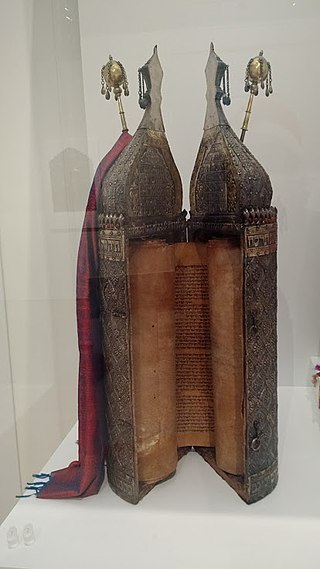Related Research Articles
Shirk in Islam is a sin often roughly translated as 'idolatry' or 'polytheism', but more accurately meaning 'association [with God]'. It refers to accepting other divinities or powers alongside God as associates. In contrast, Islam teaches that God does not share divine attributes with anyone, as it is disallowed according to the Islamic doctrine of tawhid. The Quran, the central religious text of Islam, states in 4:48 that God will not forgive shirk if one dies without repenting of it.

Al-Baqarah, also spelled as Al-Baqara, is the second and longest chapter (surah) of the Quran. It consists of 286 verses (āyāt) which begin with the "muqatta'at" letters alif (ا), lām (ل), and mīm (م). The Verse of Loan, the longest single verse in the Quran, is in this chapter.
Taqwa is an Islamic term for being conscious and cognizant of God, of truth, "piety, fear of God." It is often found in the Quran. Those who practice taqwa — in the words of Ibn Abbas, "believers who avoid Shirk with Allah and who work in His obedience" — are called muttaqin.

An-Nisa' is the fourth chapter (sūrah) of the Quran, with 176 verses (āyāt). The title derives from the numerous references to women throughout the chapter, including verse 34 and verses 4:127-130.

Al-Ma'idah is the fifth chapter of the Quran, containing 120 verses. Regarding the timing and contextual background of the revelation, it is a Medinan chapter, which means it is believed to have been revealed in Medina rather than Mecca.
Iman in Islamic theology denotes a believer's recognition of faith and deeds in the religious aspects of Islam. Its most simple definition is the belief in the six articles of faith, known as arkān al-īmān.
Al-Muʼminun is the 23rd chapter (sūrah) of the Qur'an with 118 verses (āyāt). Regarding the timing and contextual background of the supposed revelation, it is an earlier "Meccan surah", which means it is believed to have been revealed before the migration of the Islamic prophet Muhammad and his followers from Mecca to Medina (Hijra).

Yā Sīn is the 36th chapter of the Quran. It has 83 verses. It is regarded an earlier "Meccan surah". Some scholars maintain that verse 12 is from the Medinan period. While the surah begins in Juz' 22, most of it is in Juz' 23.
At-Taḥrīm is the 66th Surah or chapter of the Quran and contains 12 verses (ayah). This Surah deals with questions regarding Muhammad's wives.
Sūrat al-Layl is the ninety-second sūrah (chapter) of the Qur'an, containing twenty-one āyāt (verses). This sūrah is one of the first ten to be revealed in Mecca. It contrasts two types of people, the charitable and the miserly, and describes each of their characteristics.

In Islam, fasting is the practice of abstaining, usually from food, drink, sexual activity and anything which substitutes food and drink. During the holy month of Ramadan, sawm is observed between dawn and sunset when the adhan of the Maghrib prayer is sounded. Ramadan is the ninth month of the Muslim lunar calendar and fasting is a requirement for Muslims as it is the fourth of the five pillars of Islam.

The Tawrat, also romanized as Tawrah or Taurat, is the Arabic-language name for the Torah within its context as an Islamic holy book believed by Muslims to have been given by God to the prophets and messengers amongst the Children of Israel. In the Qur'an, the word 'Tawrat' occurs eighteen times. When referring to traditions from the Tawrat, Muslims have not only identified it with the Pentateuch, but also with the other books of the Hebrew Bible as well as with Talmudic and Midrashic writings.
Indeed, We sent down the Torah, in which was guidance and light. The prophets who submitted [to God] judged by it for the Jews, as did the rabbis and scholars by that with which they were entrusted of the Scripture of God, and they were witnesses thereto. So do not fear the people but fear Me, and do not exchange My verses for a small price [i.e., worldly gain]. And whoever does not judge by what God has revealed - then it is those who are the disbelievers.
In Twelver Shia Islam, the Ancillaries of the Faith are a set of practices that Shia Muslims have to carry out.
Tawba is the Islamic concept of repenting to God due to performing any sins and misdeeds. It is a direct matter between a person and God, so there is no intercession. There is no original sin in Islam. It is the act of leaving what God has prohibited and returning to what he has commanded. The word denotes the act of being repentant for one's misdeeds, atoning for those misdeeds, and having a strong determination to forsake those misdeeds. If someone sins against another person, restitution is required.
Justice is a central theme in the Qur’an, dictating the traditions of law and how they should be put into practice. There are two ways in which justice operates: in a legal sense and in a divine sense. Regarding justice in the legal sense, the Qur’an tells Muslims not only how to conduct themselves, but is also highly important regarding relationships with other people. It states what the various punishments for certain crimes should be along with the justification behind this reasoning. Furthermore, the Qur’an brings across the idea that anyone who propagates the message of justice and acts accordingly will be justly rewarded with their place in jannah. With regard to divine justice, there has been a discourse between many commentators debating how justice will be fulfilled for different people, although all agree that Allah shall not do any injustice. It is debated as to how justice regarding non-Muslims functions. Although Qur'an is not direct on justice for non-Muslims but on three occasions this book clearly enunciates that the good deeds of the humans belonging to other religious backgrounds are not to be wasted before Allah., and from these verses, it can be inferred directly that Creator i.e. Allah has nothing to do with religious background but the good deeds of the actor will always be rewarded both in this world and hereafter too, enshrining the justice for all by Allah.
A famous recorded oral tradition among Muslims is about comment made by Imran ibn Husain, one of the companions of Muhammad and a Narrator of hadith. The comment was regarding the prohibition of Mut'ah, a word with several meanings. It is used in both Nikah mut'ah and Mut'ah of Hajj.
Sin is an important concept in Islamic ethics that Muslims view as being anything that goes against the commands of God or breaching the laws and norms laid down by religion. Islam teaches that sin is an act and not a state of being. It is believed that God weighs an individual's good deeds against their sins on the Day of Judgement and punishes those individuals whose evil deeds outweigh their good deeds.
Fidyah or fidya and kaffara or kaffarah are religious donations made in Islam when a fast is missed or broken. The donations can be of food, or money, and it is used to feed those in need. They are mentioned in the Qur'an. Some organizations have online fidyah and kaffara options.
Khawlah bint Tha'labahKhawla bint Tha'laba b. Asram b. Fihr b. Qays b. Tha'laba b. Ghanm b. Salm b. 'Auf was one of the female companions of Muhammad. She is mentioned in the Quran in reference to Zihar. The 58th chapter of the Quran Al-Mujadila, meaning "The pleading woman" derives the name from her reference.
Manasik is the whole of rites and ceremonies that have to be performed by Islamic pilgrims in and around Mecca. The Qur'an differentiates between two manasiks: The Manasik of Hajj, has to be done in the month Dhu al-Hijjah and The Manasik of ʿUmra, which can be performed any time of the year. The knowledge of manasik is an independent part of Fiqh.
References
- 1 2 3 4 Chelhod, J. (October 2010). "Kaffāra". brillonline.
- 1 2 Ibn Manzur. Lisan al-Arab. Vol. 5. p. 148.
- 1 2 3 4 5 6 7 8 9 Busaq, Dr. Muhammad Al-Madni (2005). perspectives on modern criminal policy & islamic sharia. King Fahd National Library Cataloging-in-publication Data. p. 166. ISBN 978-9960-9687-4-2.
- 1 2 3 Soufi, Denise. "FASTING". iranicaonline.
- ↑ Black, Esmaeili, Hosen, E. Ann, Hossein, Nadirsyah (2013-01-01). Modern Perspectives on Islamic Law. Edward Elgar Pub (February 26, 2015). ISBN 978-1782545521.
{{cite book}}: CS1 maint: multiple names: authors list (link) - 1 2 Brockopp, Jonathan E. (2003). Islamic Ethics of Life: Abortion, War, and Euthanasia. University of South Carolina Press (May 1, 2003). ISBN 978-1570034718.
- ↑ Suyuri, al-Miqdad ibn Abd Allah (2001). Kanz al-irfan fi fiqh al-Quran. Maktab Nuwayd Islam. pp. 367–369. ISBN 978-9646485822.
- ↑ Naser Makarem Shirazi. Tafsir Nemooneh. Vol. 5. p. 625.
- ↑ Al-Tusi, Muhammad ibn Hasan (2008). Concise Description of Islamic Law and Legal Opinions. Islamic College for Advanced Studie; UK ed. edition (October 1, 2008). ISBN 978-1904063292.[ permanent dead link ]
- ↑ Akhtar Rizvi, Allamah Sayyid Sa'eed (25 May 2014). "Lesson 55: Muftirat & Kaffarah".
- ↑ Mohsen Fayz Kashani. Tafsir Safi. Vol. 5. p. 193.
- ↑ Abdul Ali Aroussi Howayzi. Tafsir Noor al-Thaqalayn. Vol. 5. p. 368.
- ↑ Thanvi, M.Ashraf Ali (1999). Bahishti Zewar. Islamic Book Service (2010). ISBN 978-8172315603.
- ↑ Shaykh Tabarsi. Tafsir Javame Al-Jame. Vol. 1. p. 532.
- ↑ Khan, Saniyasnain (2000). Tell Me about Hajj. Goodword Books, 2000. ISBN 978-8187570004.
- ↑ Ph.D, Prof Drs H. Akh Minhaji, M. A. (1 November 2008). Islamic Law and Local Tradition:: A Socio-Historical Approach. Kurnia Kalam Semesta. ISBN 9789798598340 – via Google Books.
{{cite book}}: CS1 maint: multiple names: authors list (link)[ permanent dead link ] - ↑ Shaykh Tusi. Al-Tibbyan Fi Tafsir al-Quran. Vol. 19. p. 541.
- ↑ Tabatabaie, Mohammad Husayn (2004). Al-Mizan Fi Tafsir Al-Quran an abdridged version Hardcover Volume 19. Ansariyan Publications; 1st edition (2013). p. 177. ISBN 978-9642193769.
- ↑ MURATA, SACHIKO. "DIVORCE". iranicaonline.
- ↑ Dutton, Yasin (2002). The Origins of Islamic Law: The Qurʼan, the Muwaṭṭaʼ and Madinan ʻAmal. Routledge; 1 edition (September 1, 2002). ISBN 978-0700716692.